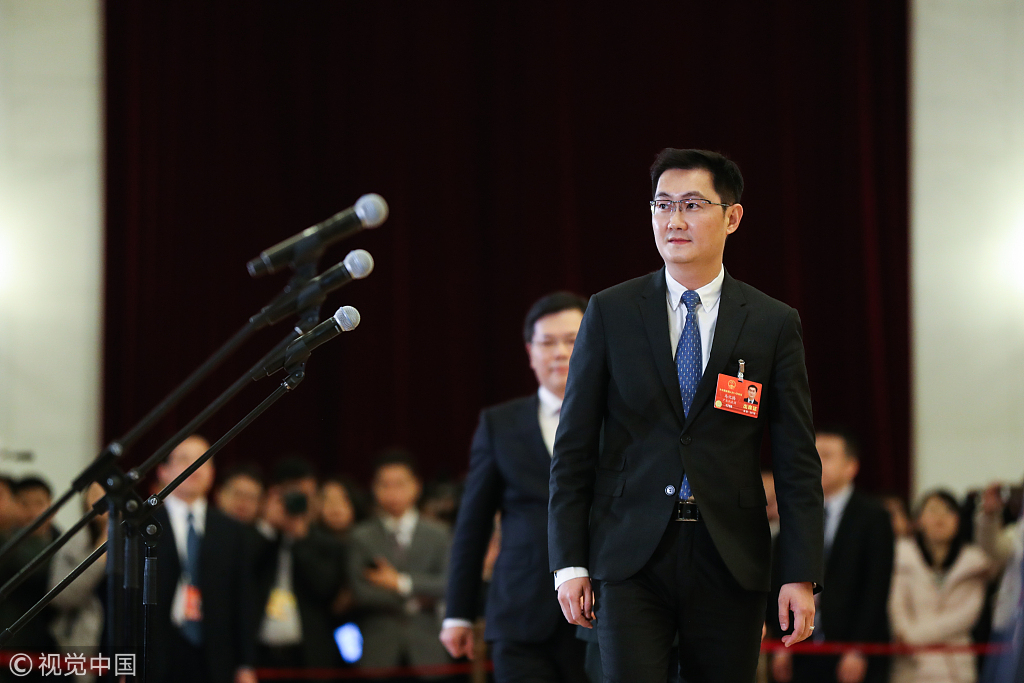[:en]

1. Pony Ma Huateng, chairman and CEO of Tencent, and a deputy to the 13th National People’s Congress
Keywords: Digital China, Guangdong-Hong Kong-Macao Greater Bay Area
This year, Ma brings eight suggestions to the top legislature, covering Digital China, industrial internet, digital culture, financial security, medical healthcare, teenager innovation talent training, the construction of the Guangdong-Hong Kong-Macao Greater Bay Area and ecological environmental protection.
“China’s Internet Plus strategy is an approach while the digital economy is the result, both of which serve the goal of ‘building the country into a Digital China’ and an internet power,” he said.
Daily lives will become more efficient if the likes of big data, cloud computing, and artificial intelligence are better incorporated into industrial, medical, financial, cultural and educational endeavors, he noted.

2. Robin Li Yanhong, chairman, and CEO of leading Chinese search engine Baidu Inc and a member of the 13th National Committee of the Chinese People’s Political Consultative Conference
Keywords: artificial intelligence, self-driving, tax reduction
In his proposal, Li called for preferential funding and tax policies, encouraging enterprises to open their artificial intelligence platforms and technologies, as well as fostering a batch of national AI open platforms with strong competitiveness and great influence.
In addition, Li said the eligibility criteria for self-driving vehicles’ operation should be clarified as soon as possible, and the authorities should issue licenses to suitable enterprises. Moreover, companies that meet certain requirements should be encouraged to take a lead in carrying out self-driving operational services, he said.

3. Lei Jun, CEO of tech giant Xiaomi and a deputy to the 13th National People’s Congress
Keywords: Belt and Road Initiative, China’s design industry
In his suggestions to the top legislature this year, Lei said a Belt and Road integrated service platform should be established to support private enterprises going out. In addition, a Made in China brand ambassador should be set up to help private enterprises realize brand globalization.
Moreover, regarding how to develop China’s design industry and improve the design level, he said, the country should set up national design promotion institutions and give priority to the development of an industrial design. Professional design parks should be built in cities where the manufacturing industry developed rapidly.

4. Liu Qiangdong, chairman of e-commerce retailer JD and a member of the 13th National Committee of the Chinese People’s Political Consultative Conference
Keywords: e-commerce, poverty reduction
In his proposal, Liu called for building a new e-commerce road to help rural people out of poverty and get rich. However, he also expressed concern that some agricultural products cannot meet the national standard and have a lack of brand development, as well as a less developed rural logistics infrastructure.
Liu said the country should promote the mass production of agricultural products, actively implement the “poverty reduction brands” cultivation action, unveil incentive policies to speed up the construction of logistics infrastructure, and promote the “consumption poverty reduction”.

5. Yang Yuanqing, CEO, and chairman of Lenovo
Keywords: artificial intelligence, industrial intelligence
Artificial intelligence must be combined with industries to create an effective industrial intelligence, helping the transformation and upgrading of traditional industries and promoting a rapid integration of artificial intelligence and the real economy, Yang said.
In addition, to promote industrial intelligence, the country should strengthen basic research, enhance innovation capability, and make breakthroughs in core technology. The government should put efforts to cultivate leading enterprises and spread in key sectors. Moreover, a national industrial intelligence service platform should be established to support the intelligence reconstruction of small and medium-sized enterprises.

6. Ding Lei, CEO of NetEase Inc and a member of the 13th National Committee of the Chinese People’s Political Consultative Conference
Keywords: education, elderly services, healthcare
This year, Ding prepared three proposals covering children’s and teenagers’ education, elderly services and medical healthcare.
Education is among the top concerns. Currently, China’s high-quality educational resources are concentrated in first and second-tier cities, while in third and fourth-tier cities and rural areas, people face a shortage of educational resources. Ding said he hoped the internet and artificial intelligence could help spread high-quality educational resources to every corner of China.

7. Wang Xiaochuan, CEO of Chinese search engine Sogou Inc and a member of the 13th National Committee of the Chinese People’s Political Consultative Conference
Keywords: healthcare reform, digital family doctor
For Wang, medical care reform is the top priority for people’s livelihoods. China began its latest round of healthcare reform in 2009, with a core objective of offering healthcare services to all people. The government’s achievements in expanding health care reform have been remarkable. However, people still face difficulty and high medical costs when seeing a doctor.
Wang said healthcare reform could be combined with the internet, connecting patients and high-quality medical resources and enhancing the efficiency and accuracy of medical services.
He called for a new medical treatment partnership that includes top-tier hospitals, primary-level medical and healthcare institutions and virtual family doctors based on digital technology. Wang said he hoped that each family will have its own digital family doctor in next 5-10 years.

8. Zhou Hongyi, chairman of 360 Security Technology, and a member of the 13th National Committee of the Chinese People’s Political Consultative Conference
Keywords: cybersecurity
This year, Zhou’s proposals all related to cybersecurity, including strengthening the management of network security vulnerability, promoting the integration innovation of industrial internet security and improving the talent training system of cybersecurity.
The country is in urgent need of cybersecurity talent, and the cybersecurity workforce gap will surge to 1.4 million by 2020, based on estimates from experts and organizations. In his proposal, Zhou called for more cooperation between internet security companies and universities in cybersecurity talent cultivation and construction of related disciplines.
[:]

Leave a Reply
You must be logged in to post a comment.